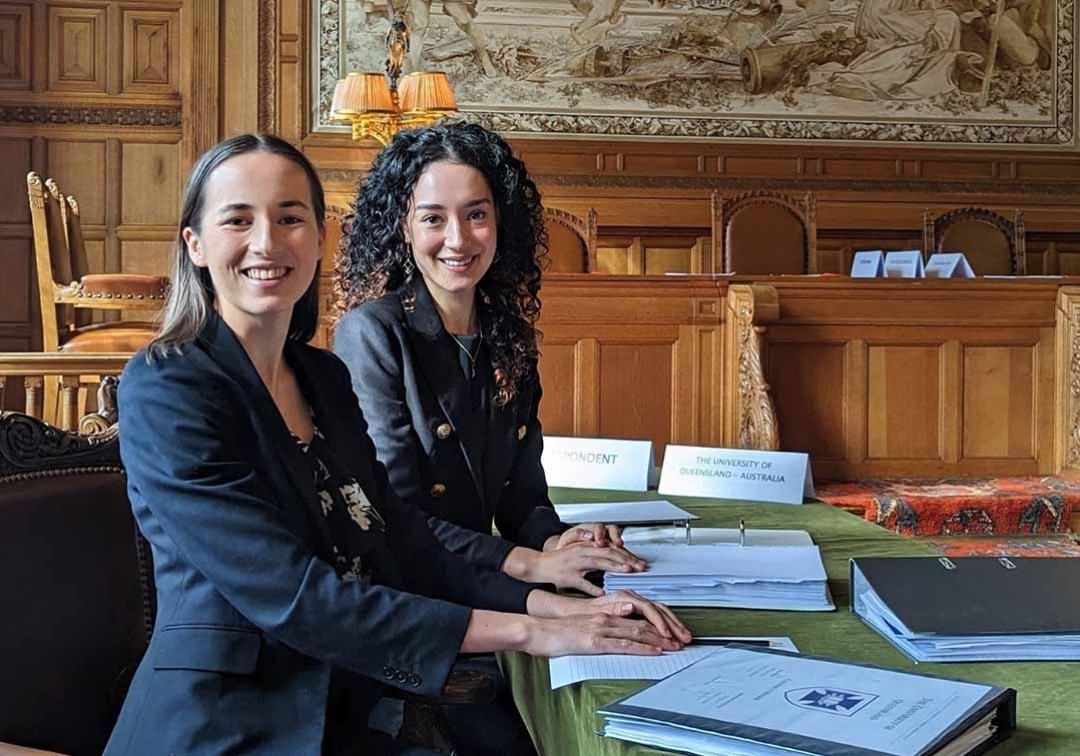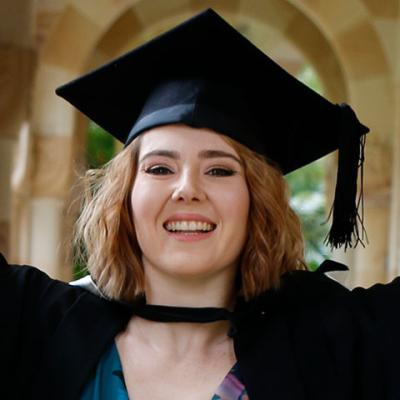
Bachelors of Journalism / Laws (Honours)
Overview
Develop practical legal and communications skills that will help you stand out from the field, kickstarting your career in the media or legal professions.
In this dual degree, you'll build a solid understanding of the legal and journalism professions, preparing yourself for a diverse range of career options across media, communications and legal industries.
The journalism component of this dual degree will teach you to tell great stories in innovative and engaging ways, and to shape the future using creativity and imagination.
It will develop your understanding of journalism and its media and communication contexts, and the skills and reflection necessary to be a professional journalist. You'll learn the principles and practices of new digital media production, giving you the ability to undertake internships, fieldwork studies and independent project work.
The Bachelor of Laws (Honours) is designed to provide you with a broad introduction to the legal system, and a thorough and critical understanding of core areas of law and legal theory.
You'll develop useful professional, clinical and legal analysis skills including traditional and modern legal research methods, legal writing, advocacy and alternative dispute resolution. The program emphasises interactive learning, internationally relevant content and the promotion of ethical values.
Program highlights
- Graduate with an internationally respected honours qualification, with advanced knowledge and skills that will set you apart in a competitive job market.
- Attain the academic requirements for admission as a legal practitioner in Australia.
- Learn from award-winning journalists, editors, visual communicators, digital media experts, television broadcasters, radio reporters and media executives.
How you'll learn
Your learning experiences are designed to best suit the learning outcomes of the courses you choose.
- Lectures
- Tutorials
- Work placements
- Overseas study
- Research experience
What you'll study
At UQ, degrees are called 'programs' and subjects are called 'courses'.
Career possibilities
Our programs prepare you for your first job and beyond. Here are some of the careers you could be on your way to:
- Solicitor
- Barrister
- Human rights advocate
- Insolvency practitioner
- Insurance professional
- Legal content writer
- Legal content editor
- Court reporter
- Journalist
- Correspondent/Journalist
Graduate salary
Law & paralegal studies (undergraduate)
compared.edu.au
Professional memberships
When you graduate, you may be eligible for memberships with the following professional organisations. Contact the organisation to find out how to become a member.
- Bar Association of Queensland
- Queensland Law Society
Program accreditation
The Bachelors of Journalism / Laws (Honours) is accredited by:
- Legal Practitioners Admissions Board
Events
See all events
29 June
Voyages to the Underworld: UQ Centre for Western Civilisation Winter School
Stories
See all stories
Careers
How a law degree can help you drive positive social impact
6-minute read

Uni life
Extracurricular activities and opportunities for law students
5-minute read
Stories
See all stories
Careers
How a law degree can help you drive positive social impact
6-minute read

Uni life
Extracurricular activities and opportunities for law students
5-minute read
Entry requirements
Prerequisites
- General English subject (Units 3 & 4, C).
Prerequisites
- General English subject (Units 3 & 4, C).
Entry score threshold
| ATAR / Rank | IB |
|---|---|
| 97.5 | 41.75 |
These are the lowest adjusted scores we made an offer to in Semester 1, 2025. Entry scores are based on the most recent Semester 1 intake and are updated in April each year. Meeting the entry score threshold doesn't guarantee admission.
Guarantee your place at UQ: If you meet our guaranteed minimum ATAR you could secure an offer for your preferred program.
English language requirements
IELTS overall 7; writing 7; speaking 7; reading 6; listening 6. For other English Language Proficiency Tests and Scores approved for UQ
TOEFL iBT (including Paper Edition) - Overall 100, listen 19, read 19, write 27, speak 23
PTE Academic - Overall 72, listen 60, read 60, write 72, speak 72
BE - A minimum overall grade of 5 plus a minimum grade of A in Writing and Speaking
CES - Overall 185, listening 169, reading 169, writing 185, speaking 185
OET is not accepted
There are other ways to meet the English language requirements. For some programs, additional conditions apply.
Student visas
International students who are accepted into full-time study in the Bachelors of Journalism / Laws (Honours) are eligible to apply for an Australian student visa (subclass 500).
There are a number of requirements you must satisfy before a visa is granted, including the Genuine Student (GS) requirement.
Entry score range
This table shows the range of entry scores for recent secondary students offered a place in the B Journalism/B Laws (Hons) for Semester 1, 2025
| Without adjustments | With adjustments | |
|---|---|---|
| Highest | 98.75 | 99.95 |
| Median | 96.35 | 99.4 |
| Lowest | 93.8 | 97.55 |
Who you'll study with
Here's a snapshot of our student intake for this program in Semester 1, 2025:
| Applicant background | Number of students | Percentage of all students |
|---|---|---|
(A) Higher education study | <5 | <5 |
(B) Vocational Education and Training (VET) study | 0 | 0% |
(C) Work and life experience | 0 | 0% |
| (D) Recent secondary education | ||
| N/P | N/P |
| 0 | 0% |
| 0 | 0% |
International students | 0 | 0% |
Total | 8 | 100% |
"<5" — The number of students is less than 5.
N/A — Students not accepted in this category.
N/P — Not published. The number is hidden to protect the privacy of students in other cells.
Need help meeting the entry requirements?
Fees and Scholarships
Indicative annual fee
Approximate yearly cost of tuition (16 units). Your fees will vary according to your selected courses and study load. Fees are reviewed each year and may increase.
$17,400
2026
Approximate yearly cost of tuition (16 units). Your fees will vary according to your study load. Fees are reviewed each year and may increase.
AUD $54,096
2026
Government assistance
Financial aid
As an international student, you might be eligible for financial aid – either from your home country, or from the Australian Government.
HECS-HELP
Domestic places in the Bachelors of Journalism / Laws (Honours) are Commonwealth supported, as long as you meet all Commonwealth supported place eligibility requirements.
This means the cost of your education is shared between you and the Australian Government. Instead of tuition fees, Commonwealth supported students pay what are called student contribution amounts.
If you have a Commonwealth supported place, you may also be eligible for HECS-HELP. This is an Australian Government loan scheme to assist eligible students with the cost of their student contribution amounts.
Centrelink support
The Australian Government offers a number of income-support payments to eligible Australian university students.
Scholarships
You may be eligible for more than 100 scholarships, including:
How to apply
Applying online
If your senior schooling is from outside Australia, you can submit your application to UQ. Or, if you prefer, you can use an approved UQ agent near you.
The program code for the Bachelors of Journalism / Laws (Honours) is 2512.
How to apply for undergraduate study
If your senior schooling is from Australia
Submit your application to the Queensland Tertiary Admissions Centre if you're an international student who is currently studying:
- Australian Year 12 (in Australia or another country), or
- the International Baccalaureate in Australia.
The QTAC code for the Bachelors of Journalism / Laws (Honours) is 737102.
Applying through QTAC
All domestic applications should be submitted to the Queensland Tertiary Admissions Centre (QTAC).
The QTAC code for the Bachelors of Journalism / Laws (Honours) is 737102.
Important dates
If you’re studying Year 12 in Australia, go to the QTAC website to check the closing date for this program.
If you’re applying to UQ, the closing date for this program is:
- To commence study in semester 2 - May 31 of the year of commencement.
- To commence study in semester 1 - November 30 of the previous year.
Visa processing times vary. Apply and accept your offer as early as you can.
To learn more about UQ dates, including semester start dates, view the Academic Calendar.
Important dates
To check the closing date for this program, go to the QTAC website.
To learn more about UQ dates, including semester start dates, view the Academic Calendar.
Admissions schemes
Applying to university can be both exciting and daunting, which is why we’ve tried to make the process as simple as we can.
We have several schemes in place to improve your chances of getting a place at UQ.
Pathway options
A rank or score doesn’t determine your potential.
If you're not offered a place in your first-choice program – or if you don't meet the entry requirements – you still have a number of options.
Aboriginal and Torres Strait Islander applicants
For support with applying – or if you have any questions about university life – get in touch with our Aboriginal and Torres Strait Islander Studies (ATSIS) Unit.
Explore other programs
Express yourself. And your interest.
They say choosing a degree is hard, which is why we've made it easy. Register your interest and we'll send you everything you need to know about applying to UQ.





